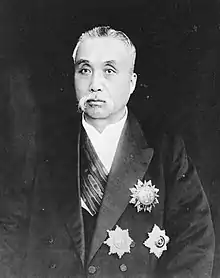Xu Shichang
Xu Shichang (Hsu Shih-chang; Chinese: 徐世昌; pinyin: Xú Shìchāng; Wade–Giles: Hsü2 Shih4-ch'ang1; courtesy name: Juren (Chu-jen; 菊人); October 20, 1855 – June 5, 1939) was the President of the Republic of China, in Beijing, from 10 October 1918 to 2 June 1922. The only permanent president of the Beiyang government to be a civilian, his presidency was also the longest of the warlord era.
Xu Shichang | |
|---|---|
 | |
| President of the Republic of China | |
| In office 10 October 1918 – 2 June 1922 | |
| Preceded by | Feng Guozhang |
| Succeeded by | Zhou Ziqi |
| Premier of the Republic of China | |
| In office 1 May 1914 – 22 December 1915 | |
| Preceded by | Sun Baoqi |
| Succeeded by | Lou Tseng-Tsiang |
| In office 22 March 1916 – 23 April 1916 | |
| Preceded by | Lou Tseng-Tsiang |
| Succeeded by | Duan Qirui |
| 1st Minister of the Cabinet of the Imperial Cabinet | |
| In office 8 May 1911 – 1 November 1911 Serving with Natong | |
| Monarch | Xuantong Emperor |
| Prime Minister | Yikuang, Prince Qing |
| Preceded by | Position established |
| Succeeded by | Position abolished |
| Personal details | |
| Born | 20 October 1855 Weihui, Henan, Qing Dynasty |
| Died | 5 June 1939 (aged 83) Republic of China |
Biography
Xu Shichang's ancestral hometown was Yinxian County (current Yinzhou District), Ningbo, Zhejiang Province. Born in Weihui, Henan, he was Yuan Shikai's closest friend. He was at one time the Viceroy of the Three Northeast Provinces, served as minister of the cabinet in Prince Qing's Cabinet, and tutored Emperor of China Puyi.[1] At the end of the Qing dynasty, Xu was made chief of the general staff despite being a civilian. Following the overthrow of the monarchy and the Republic of China's establishment, he was appointed minister of state by Yuan Shikai in 1912, as the latter hoped that this would appease the pro-Qing Royalist Party.[1] Xu resigned as secretary of state (premier) in protest to Yuan's imperial ambition in late 1915. He resumed his post after Yuan abandoned monarchism on 22 March 1916.[2]
His election as president was largely engineered by Duan Qirui and his Anhui clique. He was chosen because he was a civilian yet had close ties to the Beiyang Army and was neutral to both its Zhili and Anhui cliques. Lacking any military power of his own, he had to play Duan, Zhili leader Cao Kun, and Fengtian leader Zhang Zuolin against each other to stay in power.
Xu believed the monarchy would eventually be restored, and to prepare Puyi for the challenges of the modern world had hired Reginald Johnston to teach Puyi "subjects such as political science, constitutional history and English".[3]
He held a massive celebration in Beijing for China's victory in World War I on 18 November 1918, however he brought troops into the Allied intervention in the Russian Civil War. A ceasefire with Sun Yat-sen's rival Constitutional Protection government was declared and intellectuals were given greater freedom. This lasted until news from France showed how Duan Qirui promised German territory in Shandong to Japan. Large student protests (May Fourth Movement) led to Xu cracking down with mass arrests. Ma Jun (馬駿), a Muslim, led protests against the Versailles Treaty.[4][5][6][7][8][9][10][11][12] The delegation was ordered home and China refused to sign or ratify the Treaty of Versailles. Consequently, the shaky alliance between the Zhili and Anhui cliques collapsed with Duan decisively defeated. This led to the era of high warlordism. Conflict with the south flared again in 1920 and he also failed to retake Mongolia. Cao Kun, who never liked Xu, pressured him out of office and restored Li Yuanhong.
References
- Chi (1970), p. 63.
- "REPUBLIC DISPLACES MONARCHY IN CHINA; Yuan Shih-kai Decides to Reject Imperial Post and Resumes the Presidency". The New York Times. 1916-03-23. ISSN 0362-4331. Retrieved 2018-03-09.
- Li (2009), p. 113.
- Aliya Ma Lynn (1 August 2007). Muslims in China. University Press. ISBN 978-0-88093-861-7.
- "Info". hzwxzzs.com. Retrieved 2019-10-31.
- 北京李大钊故居研究室 (9 June 2015). 李大钊北京十年(交往篇). 中央编译局. pp. 149–. GGKEY:5GWR5PC215D.
- "英勇的回族英雄——马骏--黑龙江频道--人民网". hlj.people.com.cn.
- "馬駿 - 英烈紀念堂 - 中國軍網". www.81.cn.
- "马骏 - 英烈纪念堂 - 中国军网". www.81.cn.
Sources
- Chi, Madeleine (1970). China Diplomacy, 1914-1918. Cambridge, Massachusetts: Harvard University Press. ISBN 9780674118256.
External links
 Media related to Xu Shichang at Wikimedia Commons
Media related to Xu Shichang at Wikimedia Commons- China After the War (1920, English translation)
| Government offices | ||
|---|---|---|
| Preceded by Sun Baoqi |
Premier of the Republic of China (Secretary of State) 1914–1915 |
Succeeded by Lu Zhengxiang |
| Preceded by Lu Zhengxiang |
Premier of the Republic of China (Secretary of State) 1916 |
Succeeded by Duan Qirui |
| Preceded by Feng Guozhang |
President of the Republic of China 1918–1922 |
Succeeded by Zhou Ziqi |